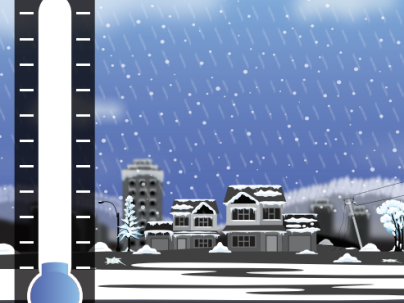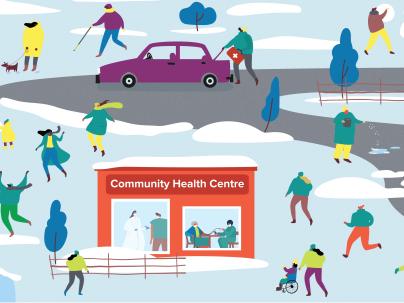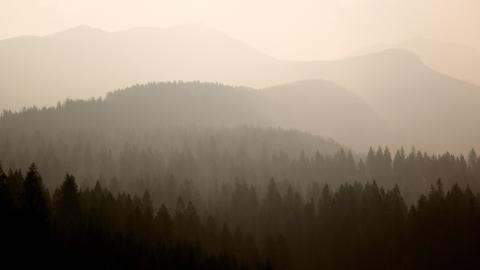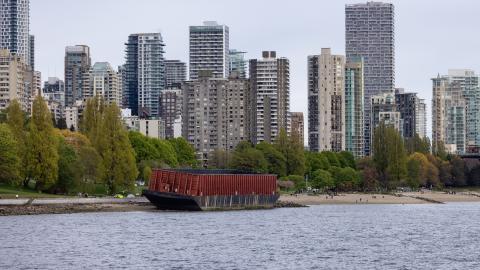極端寒冷

在極端寒冷的情況下,失溫、凍傷、滑倒、跌倒、一氧化碳中毒和潛在的致命風險會增加。冬季天氣可能會影響每個人的健康,因此請確實做好準備並採取必要的措施來確保您自己、家人和社區的安全。
冬季時的健康問題
冬季時,失溫、凍傷、滑倒、跌倒、一氧化碳中毒和潛在的致命風險會增加。冬季天氣可能對任何人的健康造成影響,因此請做好準備並在必要時採取行動。
預防滑倒
在冰雪天氣期間,戶外滑倒的風險更大。在此期間,因滑倒而前往急診室就醫或住院的人數可能會增加。每個人,無論年齡和活動力如何,都可能面臨跌倒的風險。透過正確的輔助工具和準備,可以預防跌倒。
避免滑倒的小知識
- 提前計劃,以便您有足夠的時間到達目的地。
- 如果地面上有冰和雪,請在有清理過的人行道上行走。
- 使用合腳且厚底、防滑鞋底的靴子或鞋子。
- 使用拐杖、滑雪桿或手杖幫助保持平衡。如果使用拐杖,請在末端繫上一個可伸縮的冰鎬。
- 在光滑的路面上行走時,腳趾稍微向外,進行短距離的拖步(就像企鵝一樣)。觀看這個冬季步行影片以獲取更多小知識。
一氧化碳 (CO) 中毒
在冬季,因為一些暖氣系統是燃燒燃料來保持空間溫暖,一氧化碳中毒可能會更頻繁地發生,(例如燃氣供暖、木炭或木炭爐、燃油、煤油)。當電器發生故障或在通風不良的空間,而導致吸入過多一氧化碳時,就會發生一氧化碳中毒(例如,堵塞的煙囪、關閉的窗戶或在帳篷內)。您看不到、聞不到或嚐不到一氧化碳,但它可以在幾分鐘內使您致命。
了解一氧化碳中毒的症狀與預防小知識 (HealthLink BC)
-
At home
- Heat your home to at least 21℃ if infants or elderly people are present. During winter months, heating costs may increase. If you have difficulty paying for heat, consider exploring BC Hydro’s Energy Conservation Assistance Program and check if your city or town has a rent bank.
- Make a plan and prepare your home for winter hazards in your area. See the PreparedBC Guides for Winter Weather and Storms, Power Outages, Floods, Avalanches and other BC hazards.
- Build an emergency kit and restock it after each use. See the PreparedBC Home Preparedness Guide.
- Maintain public spaces outside of your home, including sidewalks and parking areas, as safe pathways for everyone's mobility.
- Learn snow shovelling tips to prevent injuries.
- Some communities have Snow Angels / Snow Stars programs to assist seniors or people with disabilities to clear snow off walkways. This can decrease injury risk and support people's mobility. Volunteers are always needed! Contact your local government or First Nation for more information.
- During winter, carbon monoxide poisoning may occur more frequently as some heating systems burn fuel to keep spaces warm (e.g. gas heating, wood or charcoal stoves, oil, kerosene). Carbon monoxide poisoning occurs when people inhale too much carbon monoxide and can happen when appliances malfunction or are used in spaces without adequate ventilation (e.g., blocked chimneys, closed windows, or inside a tent). You cannot see, smell or taste carbon monoxide, but it can be deadly in minutes.
Learn the symptoms of carbon monoxide poisoning and prevention tips (HealthLink BC)
-
Getting around outside
- Check the weather report before going outside. Plan a safe route with extra time to navigate winter conditions.
- Dress for winter weather:
- Wear layers, preferably with a waterproof or windproof outer layer. Take off layers as you heat up to avoid sweating. The risk of hypothermia increases when you or your clothes are wet.
- Choose wool or synthetic clothing, which keeps people warmer and dryer than cotton.
- Depending on the temperature and wind (wind chill), exposed skin can freeze in minutes. Wear a hat, scarf, mittens or gloves.
- Use boots or shoes that fit well, are insulated, waterproof, and have good traction. Consider wearing traction devices on footwear, but remember that they can be slippery on smooth surfaces like tiles.
- Wear bright and reflective clothing so vehicles can see you in the dark. Drivers should proceed cautiously, and visibility can increase safety for people walking, rolling or biking.
-
Avoiding slips and falls
- Plan ahead so you have enough time to get where you're going.
- Walk on cleared walkways if there is ice and snow on the ground.
- Use boots or shoes that fit well and have a thick, non-slip tread sole.
- Use a cane, ski poles or walking sticks to help with balance. If using a cane, attach a retractable ice pick to the end.
- Take short shuffling steps with your toes pointed slightly outward on slippery surfaces (like a penguin). Watch this winter walking video for more tips.
-
Driving
- Plan travel routes ahead of time so you have enough time to get where you’re going.
- Learn how to prepare your vehicle for winter driving. Check the snow tire and chain requirements for your area.
- Monitor up-to-date information on weather and transportation at Drive BC. You can also call toll-free 1-800-550-4997 for B.C. road information 24 hours a day.
-
During winter storms and extreme cold
- Check weather advisories from Environment and Climate Change Canada and emergency alerts from Emergency Info BC.
- Contact your Local Government or First Nation for community support.
- Know where to go for the right healthcare during winter months.
- Consider rescheduling activities or limiting time outdoors during colder temperatures.
- Check-in on your neighbours, friends and family, especially older adults or people with disabilities who live alone. Make sure they are keeping warm and check if they need supplies, transportation, assistance clearing snow or other support.
Mental health and substance use
For many, winter can take a toll on physical and mental health and well-being. Don’t hesitate to get help when you need it. If you are struggling, there are supports available.
-

Mental health and substance use
Mental health and substance use services are available to provide support, serv…
-

Harm reduction
Keeping people and communities safe and healthy by preventing infections, illne…
-

Supervised Consumption and Overdose Prevention Sites
Supervised consumption and overdose prevention sites are safe spaces where team…
Local weather, shelter, and emergency information
During winter weather events, local governments, First Nations, and non-governmental organizations in the Vancouver Coastal Health (VCH) region operate shelters or encourage people to use other public spaces (like libraries and community centres) to safely warm up and avoid exposure to the cold. Some spaces are open overnight, and others are available during the day. More spaces may be added during a weather alert, when risk increases due to cold, wind and/or precipitation.
Many local governments and First Nations post updated information on their social media pages about warming centres or temporary shelters activated during winter weather warnings.
Shelter options may change quickly based on the current weather conditions and capacity. Confirm with organizations directly if services or spaces are currently available.
Learn where to find shelter, weather, and emergency information
Winter weather warnings
-

Arctic outflow warnings
Issued for Coastal British Columbia regions when any combination of wind speed and temperature gives a wind chill of -20°C or lower for 6 hours or more.
-

Extreme cold warnings
Issued for Coastal British Columbia when temperature or wind chills are expected to reach -35°C for at least 2 hours.
-

Snowfall warnings
Issued for Southern and Central Coastal British Columbia when 10 centimeters or more of snow falls within 12 hours or less; or when 5 centimeters or more of snow falls within 6 hours or less.
-

Winter storm warnings
Issued for when severe and potentially dangerous winter weather conditions are expected, including: a major snowfall (25 centimeters or more within a 24 hour period) and a significant snowfall (snowfall warning criteria amounts) combined with other cold weather precipitation types such as freezing rain, strong winds, blowing snow and/or extreme cold.
-

Flash freeze warnings
Issued when significant ice is expected to form on roads, sidewalks or other surfaces over much of a region because of the freezing of residual water from either melted snow or falling/fallen rain due to a rapid drop in temperatures.
冬季天氣警告
- 當風速和溫度的任何組合在卑詩省沿岸地區形成攝氏 -20 度或更低的風寒,並持續6小時或以上時,將發布北極寒流警告。
- 當卑詩省沿岸溫度或風寒預計將降到攝氏 -35 度並持續至少 2 小時時,將發布極度寒冷警告。
- 當卑詩省中部海岸在 12 小時或更短時間內降雪量達 10 公分或以上,或 6 小時內降雪量達 5 公分或以上時,將發布降雪警告。
- 當預計出現嚴重且有潛在危險的冬季天氣情況,包括:大規模降雪(24 小時內降雪量 25 公分或更多)和顯著降雪(降雪警告標準量)與其他寒冷天氣的降雨類型結合,如冰雨、強風、飄雪和/或極端寒冷時,將發布冬季風暴警告。
- 當區域內預計發生急遽降溫,導致已融化的雪或降雨後所殘留的水在道路、人行道或其他路面上形成廣泛結冰時,將發布急凍警告。
有關卑詩省公共天氣警報的更多資訊,請瀏覽加拿大環境及氣候變化部資源:
其他冬季天氣資源
瀏覽本地的社交媒體頁面以獲取最新動態和服務。
-
-
HealthLinkBC
Tips for staying active in winter weather
-
Health Canada
Extreme Cold Health Guide
-
Canadian Centre for Occupational Health and Safety
Safety tips for shoveling snow
-
Toward the Heart
Getting Prescriptions and Carries During Extreme Weather
-
Ontario Harm Reduction Distribution Program
Supporting people who use substances during extreme cold events.
-
-
-
Drive BC
Plan your route and receive up-to-date weather information
-
Centers for Disease Control and Prevention
How to stay safe during and after a winter storm.
-
Province of BC
Province of BC emergency kit checklist (Translated)
-
PreparedBC
PreparedBC planning for various hazards guides and tools
-
Technical Safety BC
Space Heater Safety Guide
-
-
-
City of Vancouver - Translated
Local winter weather Information
-
City of Richmond – Translated
Local winter weather Information
-
City of North Vancouver
Local snow and ice information
-
City of North Vancouver
Local winter weather Information
-
District of North Vancouver
Local Winter Weather Information
-
District of West Vancouver
Local winter weather Information
-
North Shore Emergency Management
Local winter weather Information
-
Bowen Island Municipality
Local winter weather Information
-
The Village of Lions Bay
Local winter weather Information
-
District of Squamish
Local winter weather Information
-
Town of Gibsons
Local winter weather Information
-
District of Sechelt
Local winter weather Information
-
City of Powell River
Local winter weather Information
-









